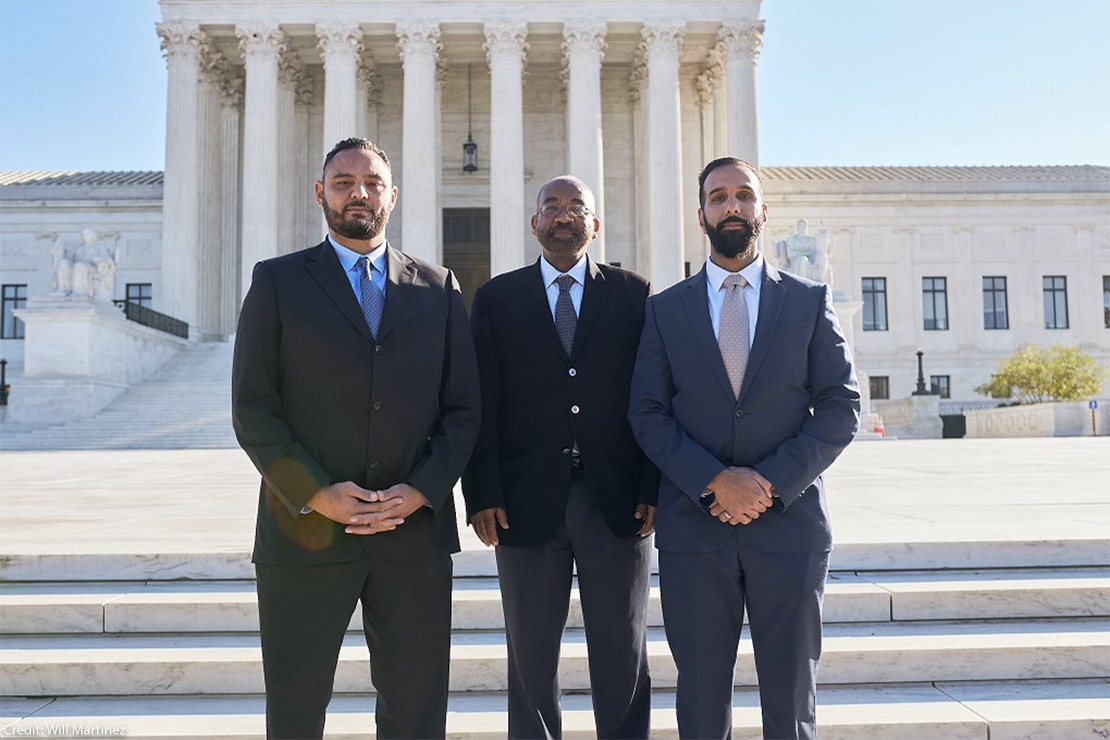Privacy & Technology
FBI v. Fazaga
In a case scheduled to be argued before the U.S. Supreme Court on November 8, 2021, three Muslim Americans are challenging the FBI’s secret spying on them and their communities based on their religion, in violation of the Constitution and federal law. In what will likely be a landmark case, the plaintiffs — Yassir Fazaga, Ali Uddin Malik, and Yasser Abdelrahim — insist that the FBI cannot escape accountability for violating their religious freedom by invoking “state secrets.” The plaintiffs are represented by the Center for Immigration Law and Policy at UCLA School of Law, the ACLU of Southern California, the American Civil Liberties Union, the Council for American Islamic Relations, and the law firm of Hadsell Stormer Renick & Dai.
Status: Closed (Judgment)
View Case
Learn About Privacy & Technology
Featured
U.S. Supreme Court
Jun 2018

Privacy & Technology
Carpenter v. United States
The Supreme Court ruled that the government needs a warrant to access a person’s cellphone location history. The court found in a 5 to 4 decision that obtaining such information is a search under the Fourth Amendment and that a warrant from a judge based on probable cause is required.
Court Case
Dec 2016

Privacy & Technology
Sarkar v. Doe - PubPeer Subpoena Challenge
The ACLU filed a motion in Michigan state court challenging the constitutionality of a subpoena issued to the website PubPeer demanding that it turn over the identities of anonymous commenters. In March 2015, the trial judge ruled that PubPeer had to unmask one – but only one – of the commenters. Both PubPeer and the researcher appealed, and the ruling was upheld in December 2016.
All Cases
70 Privacy & Technology Cases

Court Case
Jun 2024
Privacy & Technology
United States v. Hunt
This case concerns whether a warrant is required to search the information stored on a cell phone when the device itself may be properly deemed “abandoned.”
Explore case
Court Case
Jun 2024

Privacy & Technology
United States v. Hunt
This case concerns whether a warrant is required to search the information stored on a cell phone when the device itself may be properly deemed “abandoned.”

Tennessee Supreme Court
May 2024
Privacy & Technology
Free Speech
Smith v. BlueCross BlueShield
This case in the Tennessee Supreme Court asks whether the right to petition is an exception to the employment-at-will doctrine. The ACLU’s State Supreme Court Initiative, alongside the ACLU of Tennessee, filed an amicus brief focused on the scope and importance of the right to petition under the Tennessee Constitution.
Explore case
Tennessee Supreme Court
May 2024

Privacy & Technology
Free Speech
Smith v. BlueCross BlueShield
This case in the Tennessee Supreme Court asks whether the right to petition is an exception to the employment-at-will doctrine. The ACLU’s State Supreme Court Initiative, alongside the ACLU of Tennessee, filed an amicus brief focused on the scope and importance of the right to petition under the Tennessee Constitution.

Nevada
Apr 2024
Privacy & Technology
United States v. Motley — Amicus Brief
This case concerns whether police may access private and sensitive medical records without a warrant as part of a criminal investigation of an individual, when those records are contained within state prescription drug monitoring databases.
Explore case
Nevada
Apr 2024

Privacy & Technology
United States v. Motley — Amicus Brief
This case concerns whether police may access private and sensitive medical records without a warrant as part of a criminal investigation of an individual, when those records are contained within state prescription drug monitoring databases.

Pennsylvania Supreme Court
Feb 2024
Privacy & Technology
Free Speech
Commonwealth v. Kurtz
“Reverse searches” are a novel surveillance technique where the police can obtain records reflecting everyone who used a search engine to look up a particular word or phrase. In this case, the lower court approved the police using a reverse search, ruling that people do not have a reasonable expectation of privacy for any query they enter into a search engine. The ACLU’s Speech, Privacy, and Technology Project and State Supreme Court Initiative along with the ACLU of Pennsylvania filed an amicus brief in the Pennsylvania Supreme Court urging the court to reverse the lower court’s decision and hold that search history data is protected by the state and federal Constitution.
Explore case
Pennsylvania Supreme Court
Feb 2024

Privacy & Technology
Free Speech
Commonwealth v. Kurtz
“Reverse searches” are a novel surveillance technique where the police can obtain records reflecting everyone who used a search engine to look up a particular word or phrase. In this case, the lower court approved the police using a reverse search, ruling that people do not have a reasonable expectation of privacy for any query they enter into a search engine. The ACLU’s Speech, Privacy, and Technology Project and State Supreme Court Initiative along with the ACLU of Pennsylvania filed an amicus brief in the Pennsylvania Supreme Court urging the court to reverse the lower court’s decision and hold that search history data is protected by the state and federal Constitution.
